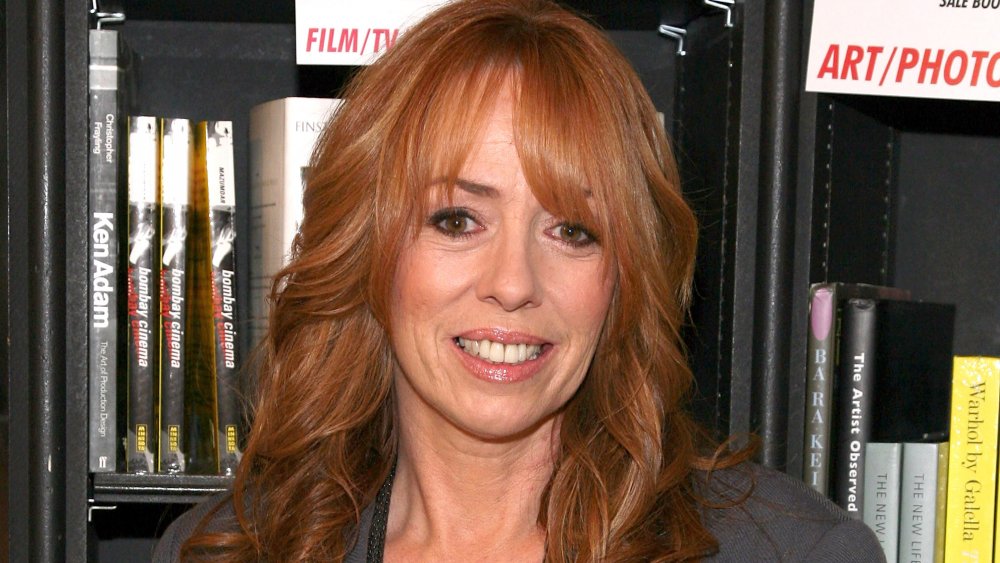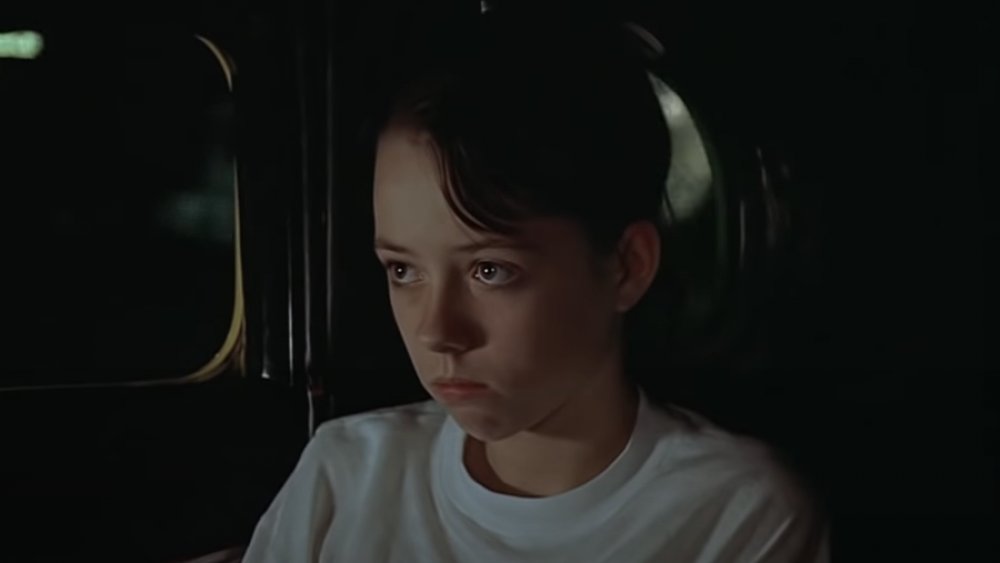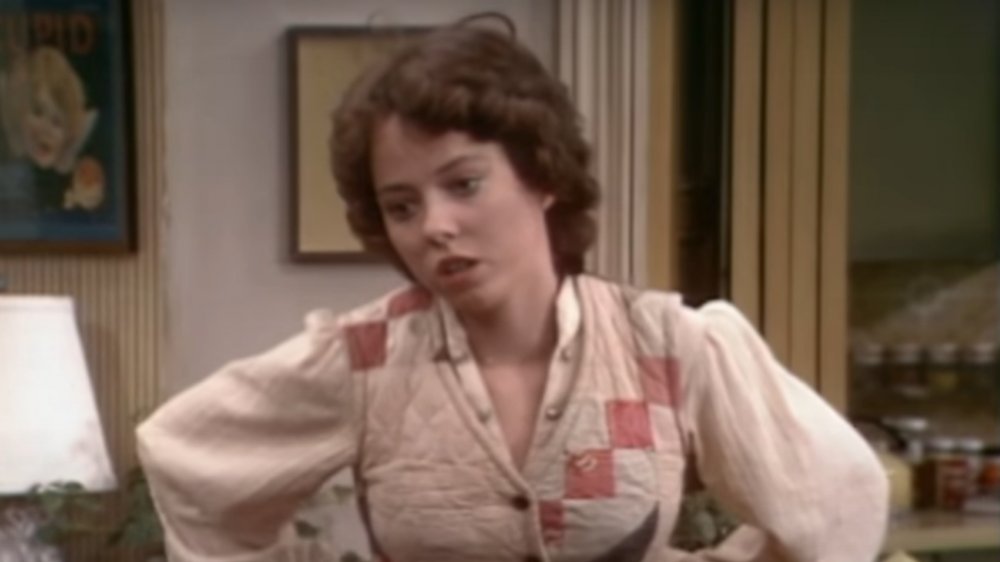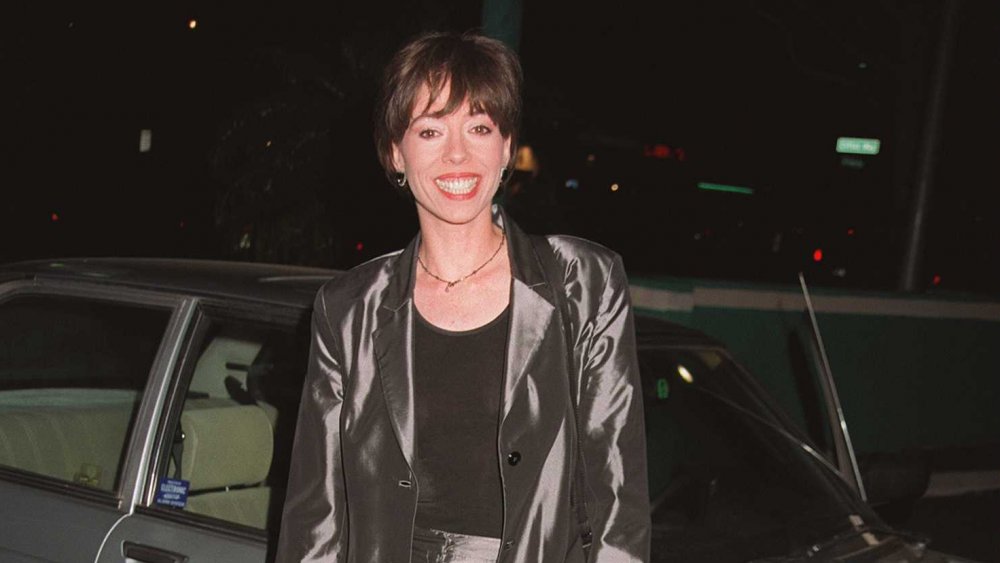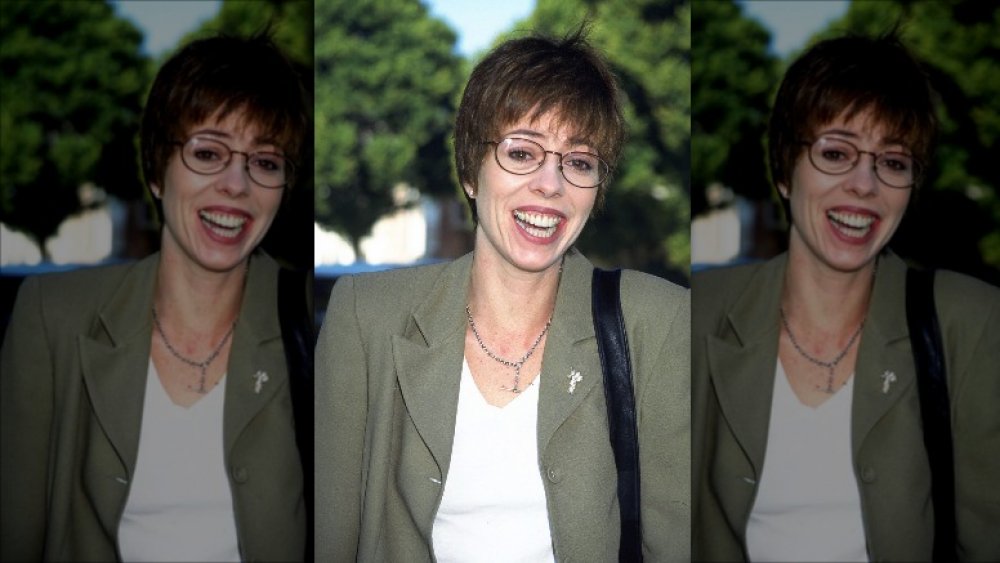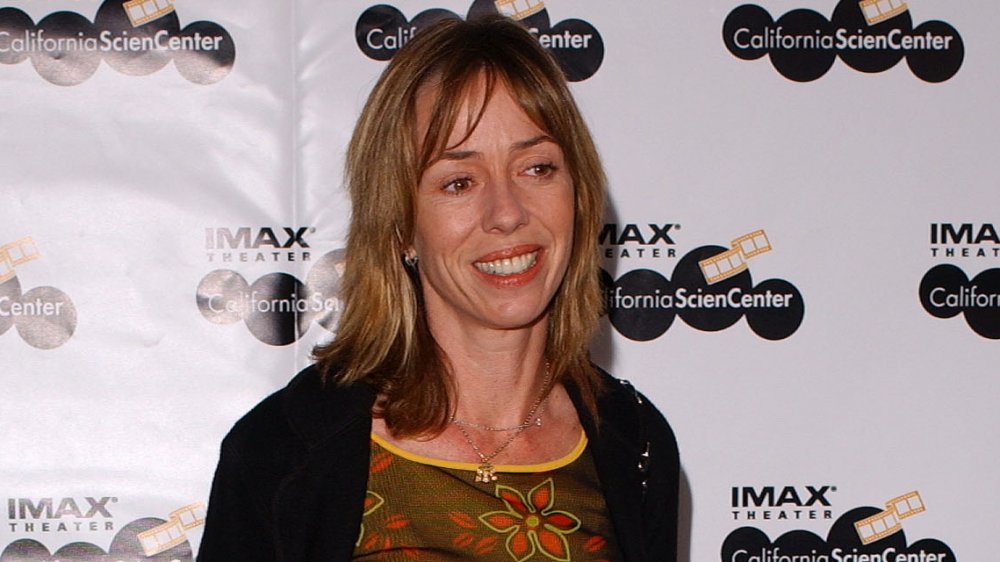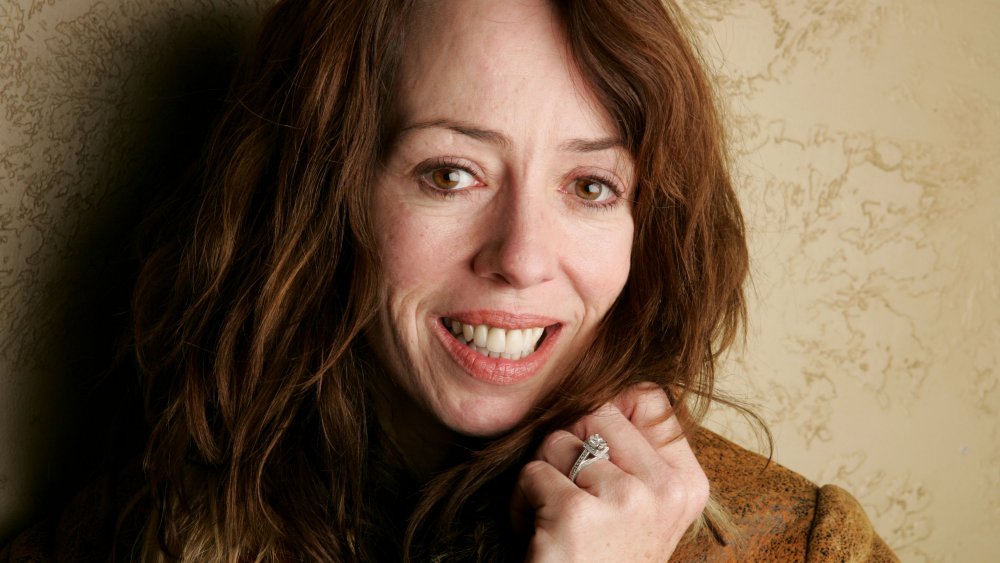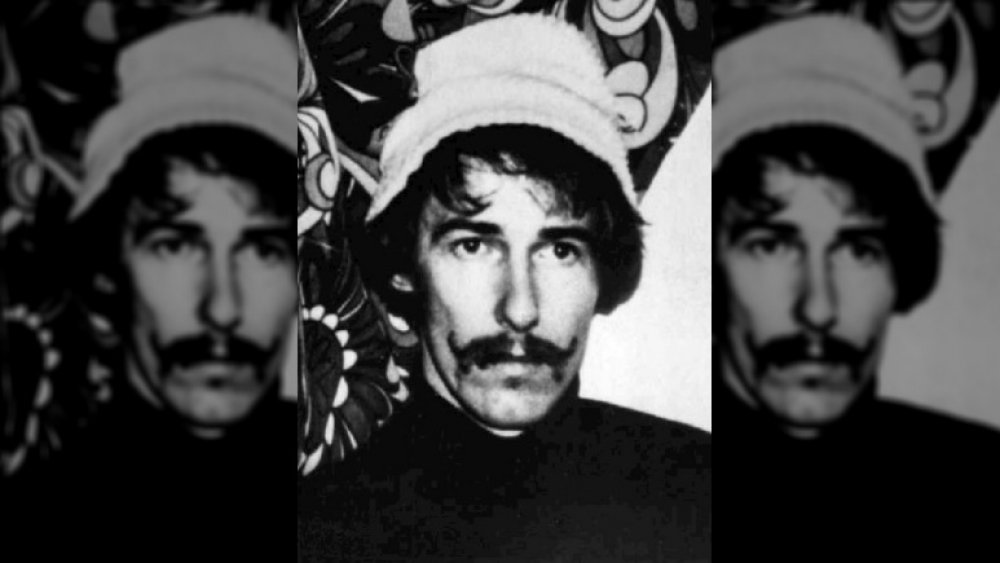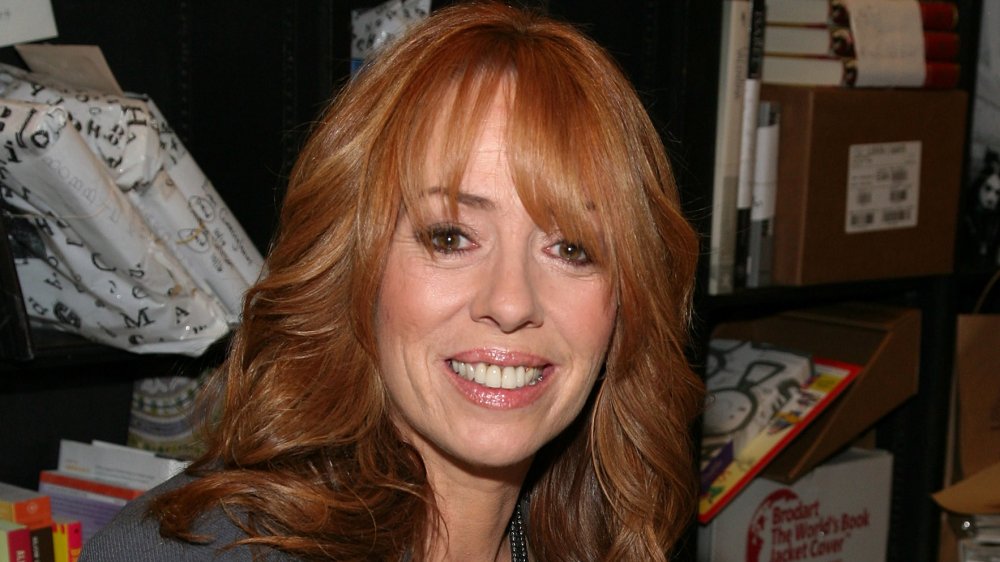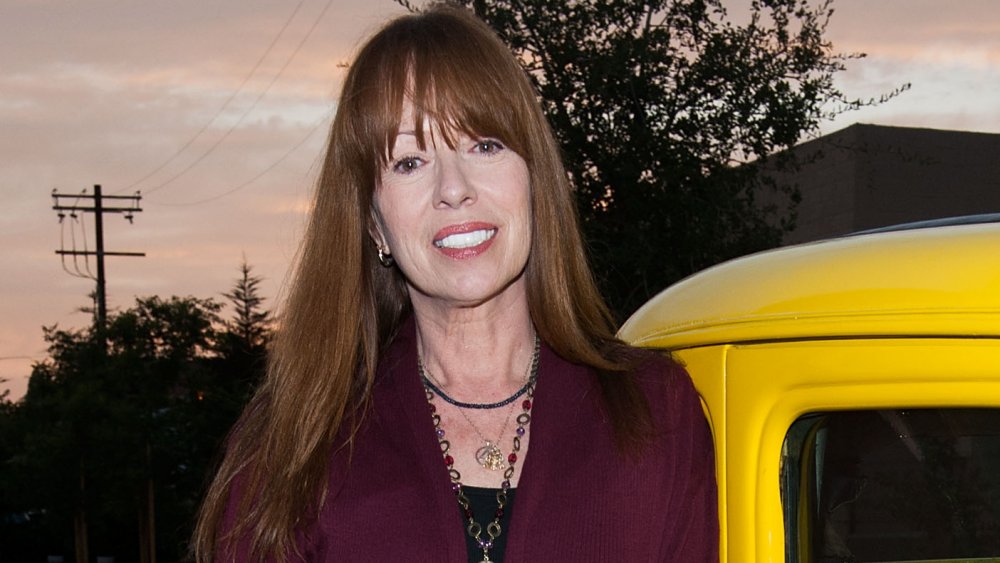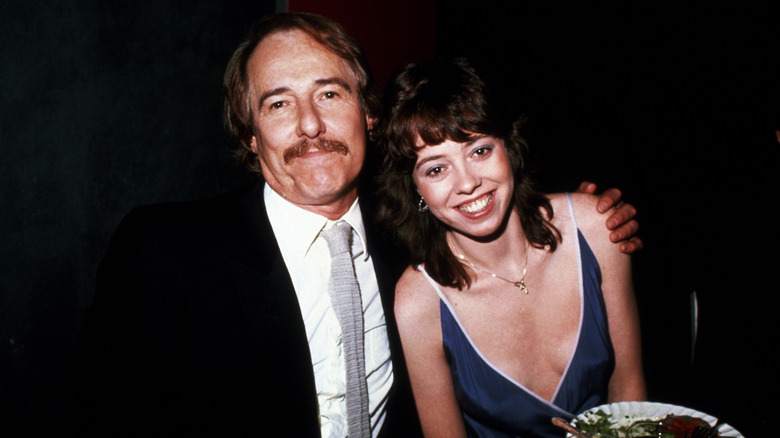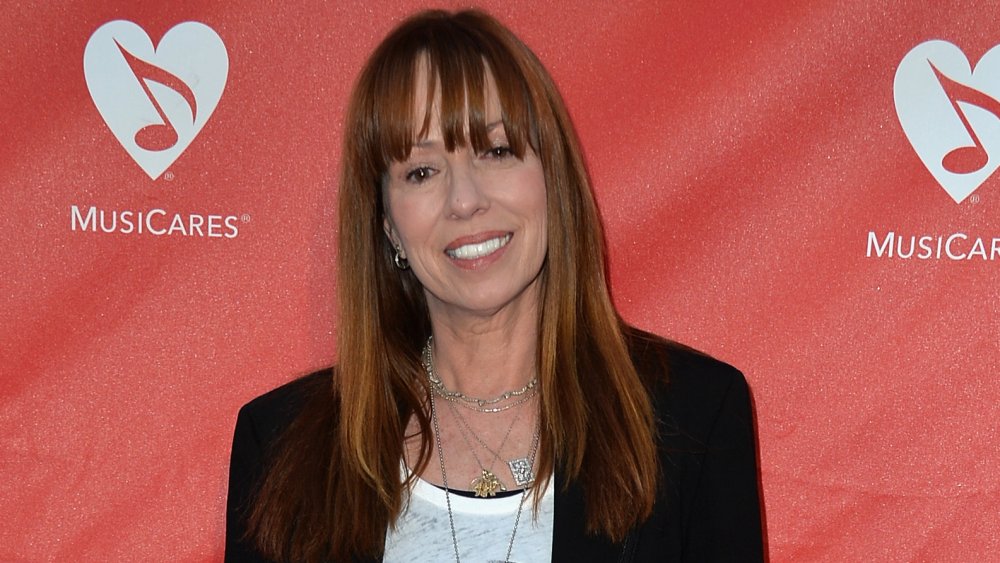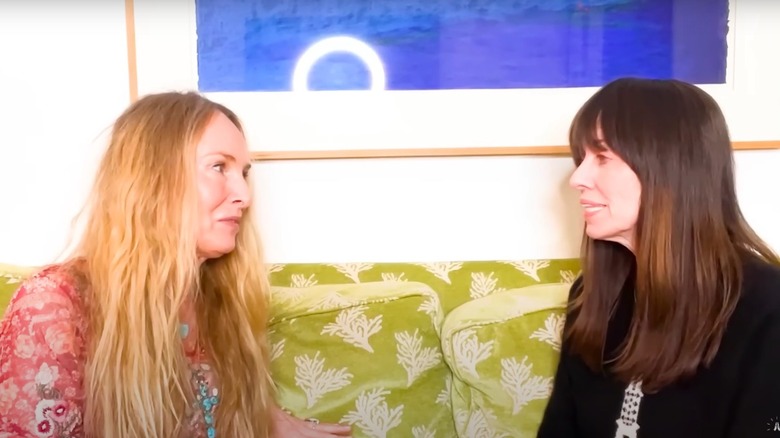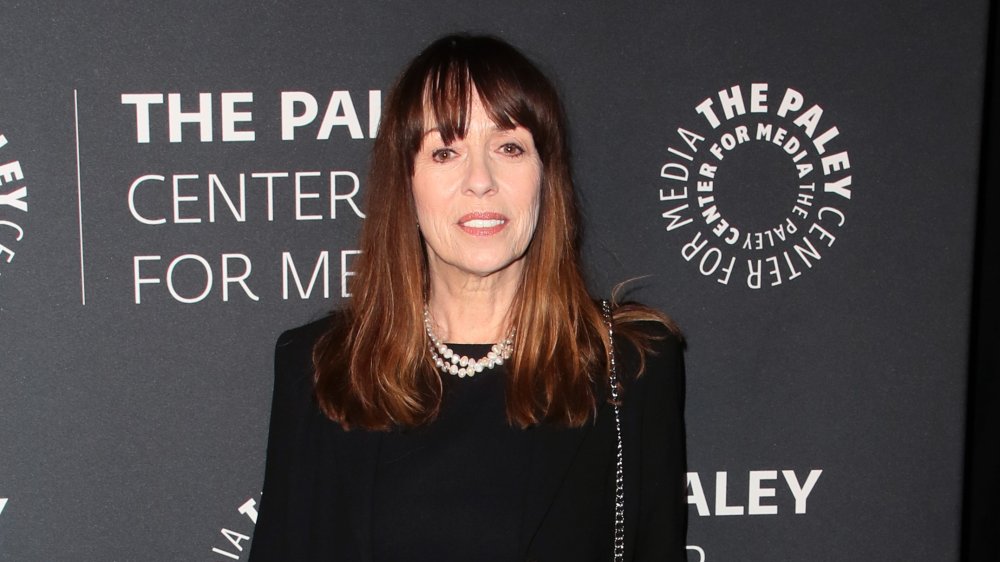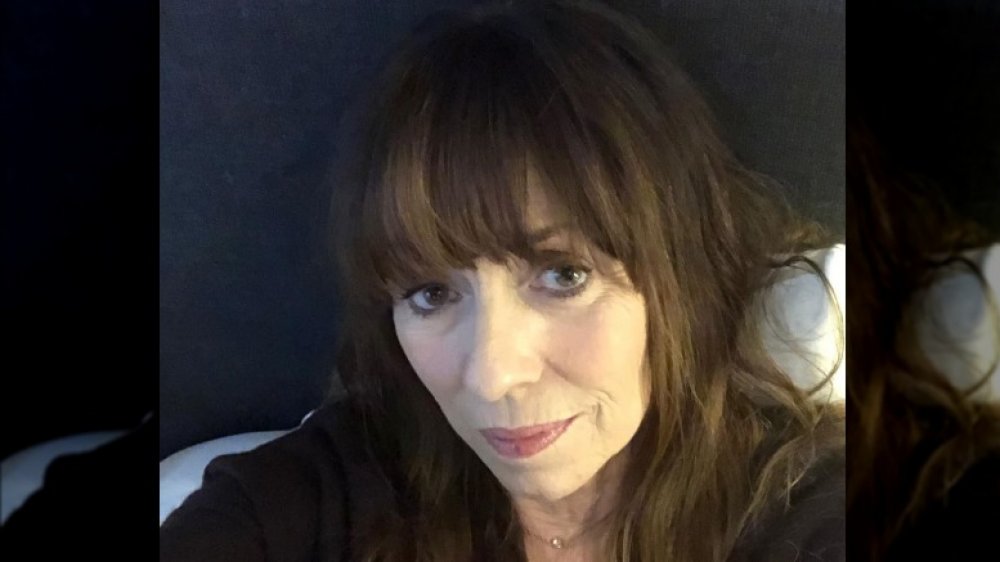The Tragic Real-Life Story Of Mackenzie Phillips
We may receive a commission on purchases made from links.
She may have been born into rock-star royalty, with talent and opportunities most people can only dream of, but Mackenzie Phillips' life has been far from charmed. Daughter of The Mamas & the Papas founder John Phillips and his first wife Susan Adams, Mackenzie established herself as a child actress when she was just 12, making her breakthrough big-screen debut in George Lucas' "American Graffiti." Further film and television roles followed, with her IMDb profile highlighting appearances on such TV series as "Baretta" and "The Mary Tyler Moore Show."
Mackenzie's big break arrived in 1975 when she was cast in "One Day at a Time." An edgy new sitcom from producer Norman Lear (whose previous successes included "All in the Family," "Sanford & Son," and "Maude"), the comedy followed the exploits of a single mother (Bonnie Franklin) raising two teenage daughters (Valerie Bertinelli and Phillips). The show became a ratings juggernaut, landing in the top 20 in its first season, and squeaking into the top 10 for its second and third seasons. The show ultimately ran for nine seasons.
The smash hit brought Phillips fame at a young age, yet darkness lay ahead for the teen star. Read on to learn more about the tragic real-life story of Mackenzie Phillips.
Mackenzie Phillips began using drugs at 10
Growing up in the late 1960s within the household of one of pop music's hottest stars, it's safe to say Mackenzie Phillips didn't have what most people would consider to be a conventional childhood. Her father, The Mamas & the Papas' leader John Phillips, was notorious for rock star debauchery and excess, and that included plenty of drugs. As Mackenzie explained on Oprah's Where Are They Now?, her father was not the kind of parent who bothered to hide his hard-partying antics from his children.
"You become desensitized to seeing all kinds of out-of-control behavior and inappropriate things," she said on the Oprah segment (as shared by HuffPost), having previously revealed that her dad taught her the finer points of rolling a joint when she was 10. By 11, she'd already experimented with cocaine, her misguided childhood mind believing that drug use was "a rite of passage" that was just part of growing up.
However, she added, there were other factors at play. "I come from a long line of undiagnosed mental illness, rampant addiction and alcoholism," she explained. "So there's the genetic component. And then there's the introduction to these types of behaviors at a very young age."
Happy 18th birthday! You're under arrest
By age 17, Mackenzie Phillips was living life in the Hollywood fast lane as a highly-paid star of the hit TV sitcom "One Day at a Time." Having loads of money and no boundaries caused her childhood experimentation with drugs to escalate, as she would detail in her 2009 memoir High on Arrival.
An early indication of trouble ahead came in November 1977, around her 18th birthday, when Phillips was arrested and charged with disorderly conduct. According to People, police reportedly found her "semiconscious" on a street in West Hollywood, while the District Attorney said officers also found a straw containing a "small trace amount" of cocaine. At the time, Phillips insisted the whole thing was a misunderstanding, claiming "some guy" at a party gave her a pill, which turned out to be a Quaalude. "I'd never taken one before," she told People. "My knees were like jelly. I asked the guy to take me to a coffeeshop, but I fell over just when a deputy came by. So they took me in."
She was placed on six months probation that required her to continue treatment from a psychotherapist she'd already been seeing. "It's called diversion therapy," she said. "And I'm happily diverted."
Why did Mackenzie Phillips leave One Day at a Time?
By November 1979, it had become impossible for the cast and producers of "One Day at a Time" to ignore the escalation of Mackenzie Phillips' drug use. According to a 1980 report in People, her colleagues on the show concluded that her newly hoarse voice, extreme weight loss, and chronic exhaustion were the result of cocaine abuse. She was told to take six weeks off to "rest and put on some weight," with the understanding that she would use the time to pull herself together.
When she returned to the set, the situation had not improved. Two weeks later, Phillips was given a choice: she could either voluntarily leave the show "for personal reasons" or be publicly fired. She eventually agreed to a statement declaring her exit was by "mutual agreement."
While Phillips' manager, Pat McQueeney, downplayed the actress' drug use to People, those who worked on the show told a far different story. "She has a drug-related medical problem," said Barbara Brogliatti, head publicist for series creator Norman Lear. "She just can't work. I consider this firing a step toward saving a child's life. The kid's in real trouble."
Mackenzie Phillips' whirlwind marriage ... and divorce
Shortly before exiting "One Day at a Time" in 1979, a then-19-year-old Mackenzie Phillips wed music producer Jeff Sessler. The marriage was a brief one, even by Hollywood standards; as UPI reported, they separated just months after marrying. Their divorce was finalized the following year.
In a subsequent interview with People, Phillips revealed she and Sessler met through mutual friend Anita Pallenberg, then the longtime girlfriend of Rolling Stones guitarist Keith Richards — both of whom had their own well-publicized issues with narcotics. "I should have known right from there it was a bad move," Phillips said, admitting her drugged-out state of mind at the time led her to unwisely rush to the altar. "I thought I was in love," she explained, adding, "I was stoned. We were all stoned. It was the drugs talking."
Although the 1981 People interview occurred a full year after Phillips and Sessler separated, she remained bitter. "Everybody knew he was a climber but me," she said of her ex. "He put $800 in the marriage the whole time, and we spent $300,000. Now he wants this and that and half my residuals from the 15 shows I did while married. It's a ripoff."
Drugs cost Mackenzie Phillips a ton of time and money
In 1981, Mackenzie Phillips and her father John Phillips had both gotten sober — although that sobriety wouldn't last long for either. According to an interview with People, during the year she was fired from "One Day at a Time," she had spent hundreds of thousands on drugs. Her father's habit had grown far worse; he admitted to spending $1 million a year on heroin and cocaine for himself and Genevieve Waite, his third wife.
"I don't know where it went, but $300,000 to $400,000 is gone, mostly for drugs," she told the magazine. "I mean, half a million in cash is gone!"
By 2014, Mackenzie Phillips had been to rehab 11 times. As she told People, her final time came when she realized she had hit bottom — and the path that lay ahead did not have a happy ending. "I thought, How many more times does the universe have to knock on the door of my consciousness and say, 'Hey Phillips, wake up?'" she said.
Relapsing after a decade of sobriety
In her book "Hopeful Healing: Essays on Managing Recovery and Surviving Addiction," Mackenzie Phillips writes about being a young mother while still abusing drugs. According to Phillips, she had locked herself in the bathroom so she could inject herself with heroin when her young son began banging on the door. She experienced "a flash of clarity" when her memory took her to her own childhood, knocking on the bathroom door looking for her father, only to hear him say, "Not now darling, Daddy's shooting up."
That epiphany led her to rehab and a decade of sobriety. However, the combination of her father's encroaching death and receiving a prescription for painkillers after undergoing surgery presented a setback. Those pills, she wrote, "are to an addict what bacon is to a reluctant vegetarian: one taste of either and you're back where you started." When her doctor cut her off from the pain pills, she got in touch with her old drug dealers, who were happy to supply her with cocaine and heroin. This relapse brought Phillips to what she described as "the darkest time in my life," when she "literally lived to shoot up, which is a god-awful way to live."
What was Mackenzie Phillips' rock bottom moment?
A flight from Los Angeles to New York in August 2008 turned out to be a pivotal moment in the life of Mackenzie Phillips. As The Seattle Times reported, Phillips never made it onto her flight; instead, she was "arrested on suspicion of possession of cocaine and heroin" after drugs were discovered while she was going through airport security.
"There was an element in me — I had been clean and sober for a long period of time before — so there was this sort of 'I know I can do it again, but not today,'" she recalled to People of her state of mind at the time of her arrest. "'I know I can get sober, but not today. Maybe sometime in the future.'"
When she was arrested, she explained, "The decision was made for me." Handcuffed and hauled to a police station, she was charged with drug possession. "Sometimes the universe has a plan to stop you in your tracks to save your life," Phillips told People. "That was that day for me."
Mackenzie Phillips' redemption came after rehab, recovery, and a guilty plea
A few months after her airport arrest, Mackenzie Phillips stood before a judge in a Los Angeles courtroom and entered a guilty plea to one count of felony cocaine possession. She also expressed her gratitude. "I'd like to take this opportunity to thank [law enforcement] for stopping me, and probably saving my life," Phillips told Judge Keith L. Schwartz.
After her arrest, Phillips realized she had hit bottom and enrolled in a drug treatment program. If she completed the entire 18-month program, the judge told her, the charges would be dropped. "You're making tremendous progress [in rehab] and I'm proud of you," the judge told Phillips, adding, "This is a lifelong battle you're in."
This time, Phillips did not relapse. She completed the entire treatment and appeared in court for her final hearing in April 2010, reported USA Today. As agreed, the judge dismissed her case. "Mackenzie deserves great credit for seizing the opportunity she was given to get clean and prove she was worthy of the dismissal of her case," her attorney, Blair Berk, declared in a statement.
Scandalous allegations about Mackenzie Phillips' famous father
In 2009, during the period between her life-changing arrest and subsequent dismissal of the case, Mackenzie Phillips shared a jaw-dropping revelation on Oprah Winfrey's talk show. She read an excerpt from her about-to-drop memoir "High on Arrival," recalling a specific memory of being in a hotel room in the late 1970s.
"I woke up that night from a blackout to find myself having sex with my own father," she read to Winfrey. "I don't remember how it started or, thankfully, how it ended ... Was it the first time? Had this happened before? I didn't know and I still don't. All I can say is that it was the first time I was aware of it ... Your father is supposed to protect you ... "
As Phillips told Winfrey, she had been fired from "One Day at a Time" and joined her father's reconstituted New Mamas & the Papas on tour. It was during this time that what she initially described as "rape" became "a consensual relationship" while both father and daughter slipped deeper into drug addiction. "It didn't happen every day. It didn't happen every week," said Phillips, "but it certainly happened."
Becoming pregnant was Mackenzie Phillips' wakeup call
In her interview with Oprah Winfrey, Mackenzie Phillips alleged that her incestuous relationship with her father lasted for a decade, an experience she described as "sort of the Stockholm Syndrome, where you begin to love your captor." She added, "And I felt great love for my father."
Their sexual relationship finally came to an end when Phillips discovered she'd become pregnant — and her father was potentially responsible. As such, Phillips claimed, he paid for her to have an abortion. That, she said, led to a big dose of reality hitting her over the head. "I was horrified," Phillips told Meredith Vieira in an interview with Today, as reported by the Daily News. "It brought me smack-dab into present time. The implications of it were just so intensely disturbing to me that I had an abortion. I never let him touch me again."
As Phillips told Winfrey, becoming pregnant "was one of those moments where you're either going to live or die, I don't mean death. I mean, wake up dead. Dead to feeling. Dead to reality."
Family turmoil after Mackenzie Phillips' incest claims
When Mackenzie Phillips' 2009 memoir was published, and her allegations of a decade-long incestuous relationship with her father came to light, her family responded in various ways. Her one-time stepmother Michelle Phillips told Showbiz 411 that she didn't believe the claims, and alleged that it was just a hook to sell the memoir. "Mackenzie has a lot of mental illness," she said, adding, "She's had a needle stuck up her arm for 35 years."
Phillips' half-sister, Chynna Phillips Baldwin (daughter of Michelle Phillips), had a very different reaction. "Many people were repulsed, horrified, for her to come out and talk about something no one wants to hear about ... I'm proud of my sister," she told ABC News, explaining she'd known "there was a consensual relationship between my father and sister ... for about 12 years."
Time did not heal the wounds in this celebrity family. In 2017, nearly a decade later, Mackenzie Phillips wrote of the ongoing fallout in her book, "Hopeful Healing: Essays on Managing Recovery and Surviving Addiction." She described being "uninvited" from a family birthday party because another family member "was just not willing to forgive me yet. She wouldn't forgive me! For abuses perpetrated against me as a child, or for exposing those abuses perhaps."
She was hit with uexpected backlash after revelation of incest with rock-star dad
It's been said that time heals all wounds, and that appeared to be the case with Mackenzie Phillips and her family. After she went public with her incestuous allegations about her father John Phillips, and after the family upheaval that resulted, the situation eventually calmed down a bit. "We are mending," she said in a 2017 interview with Fox News. She declined to share more specifics because she was sensitive about reigniting issues that had finally begun to fade into the past. "I don't want to awaken something that is finally going away ... " she explained.
However, one thing she hadn't anticipated was that the intense reactions would come from people far beyond her family as well, leading her to experience some unexpected backlash. "It is kind of stunning isn't it?" she said. "I just didn't expect the s*** storm, pardon me, that occurred."
In 2023, Phillips joined her half-sister — Chynna Phillips Baldwin, best known as one-third of the pop trio Wilson Phillips — for an interview posted to YouTube. During their conversation, the siblings discussed what had taken place in their family following the incest allegations. As Phillips Baldwin emphasized, her support had never wavered. "When I stood by you, I meant it with all my heart, you know? I really did," she said. "And I believed you. And I want you to know that I was proud of you for coming out [with your story] ... even though it was painful for everybody."
John Phillips' death left issues unresolved
In an interview with Erica Diamond, Mackenzie Phillips explained how the 2001 death of her father John Phillips spurred her to write her memoir and reveal the taboo secret of their alleged incestuous relationship. As she explained, when her father — who died of heart failure at age 65 — took ill, she experienced a range of emotions. "But mostly I was angry at him," she said.
She visited him every day in the hospital, even though he wasn't conscious, although she said she "could tell from his eyes that he could hear what I was saying. I held his hand as he died. And when he passed away, I thought, 'Crap. Now what?' He had never told me why. Why did you do this to me, Dad? How could you have?"
She continued by pointing out that while she described the relationship as "consensual," she came to comprehend that she had been "groomed to believe it was consensual." She ultimately realized "[T]here is no such thing as consensual incest. There is no such thing as consensual sex between a father and a daughter. There's not. And I'll leave it at that."
How acknowledging her C-PTSD – and how finding forgiveness – is shaping her life going forward
One of the keys to the healing that Mackenzie Phillips underwent after the revelations about her father was that she was eventually able to forgive. "Dad was something else," she said during the YouTube discussion with half-sister Chynna Phillips Baldwin. "And I get a lot of criticism and a lot of trolling online for having forgiveness in my heart." However, she also clarified the nature of that forgiveness: "Forgiveness because forgiving is for me," she explained, "not for the other person. And forgiving doesn't mean I co-sign or agree with what I'm forgiving him for. It's very complicated and yet I am at peace."
In another part of the conversation, the sisters opened up about the trauma they'd each experienced throughout their lives, which they felt has given them not just PTSD, but C-PTSD, or complex PTSD. As Phillips explained, the kind of trauma that leads to C-PTSD is different from what they called "big-T" trauma that would come from, say, experiencing a natural disaster or witnessing a murder, and which results from a single horrific occurrence. "But complex trauma is events, multiple events over time — for instance, the way we grew up ... that lead to a traumatized nervous system," she said. As Phillips Baldwin pointed out, that continual grinding on the nervous system has a tendency to manifest itself in less dramatic yet disruptive and unexpected ways, such as pain in the chest or back, and isn't nearly as well understood.
Mackenzie Phillips struggled with her mother's dementia
The death of Mackenzie Phillips' mother, Susan Adams, was a very different experience from the death of her father. As she wrote in her book, "Hopeful Healing: Essays on Managing Recovery and Surviving Addiction," Phillips revealed her mother had been suffering from dementia when she passed away.
"Was it appropriate for me to say to my 80-year-old mother who had dementia and wore diapers, 'I'm so disappointed that you're not who you used to be. I need my mommy?' No, saying that wasn't going to help," Phillips wrote, adding, "This is something for which I must find the power within myself to self-forgive, because it's okay to be scared. It's okay to want to run away. It's okay to feel helpless."
The day her mother passed, "completely loaded on morphine," Adams' cat jumped on the bed with her. "My mom said, 'You know, I never liked that f***ing cat. The one thing I like about that cat — that cat knows this is bulls***.' What better last words?" wrote Phillips. "It's almost better than 'I'd rather be in Philadelphia.'"
An inspiring new start for Mackenzie Phillips
After decades of drug-fuelled darkness, getting sober after her 11th stay in rehab led Mackenzie Phillips to an epiphany: she could take what she'd learned from a life of struggling with addiction and use that knowledge to help others. In a 2014 profile of the actress, People revealed she was now working as a drug rehab counselor for the Pasadena Recovery Center.
Speaking with the Los Angeles Times three years later, Phillips explained why she felt passionate about her new role helping guide other addicts down the road to recovery. "I recently started realizing: I'm not going to be alive as long as I have been. What do I want to do with the rest of my life?" she said.
According to Phillips, her approach as a rehab counselor is "a little bit unconventional," combining elements such as "mindfulness, kundalini yoga, psychodrama." She's also a firm believer that diet is a huge factor in sobriety, and promotes eating natural "clean" food during the process. "You are what you put into your body, and people need serious nutrition when they are getting clean," she asserted. "You can't just throw processed food toward those who are trying to reclaim their lives."

